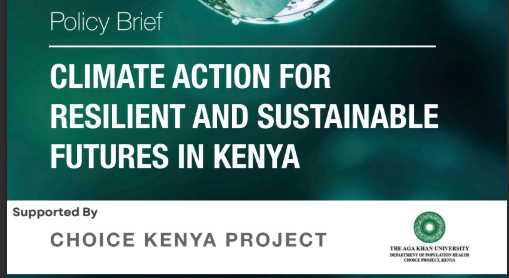By CHOICE Project Kenya – Aga Khan University, September 2025
Introduction
Climate change poses one of the greatest threats to Kenya’s sustainable development. Its impacts—ranging from prolonged droughts, erratic rainfall, and rising temperatures—are already undermining health, food security, water availability, and livelihoods. Vulnerable groups such as women, youth, persons with disabilities (PWDs), and marginalized communities bear the heaviest burden.
Recognizing these challenges, the CHOICE Project, hosted by Aga Khan University, emphasizes an integrated approach linking climate action, health, and gender equality. This policy brief calls for evidence-based, gender-responsive, and inclusive strategies to strengthen resilience while advancing multiple Sustainable Development Goals (SDGs), including SDG 13 (Climate Action), SDG 3 (Good Health), and SDG 5 (Gender Equality).
GET THE WHOLE BRIEF
You can get the whole brief by clicking on the link below:
https://drive.google.com/file/d/19r8G9xzGR1j3lJlI-tKavMCXZa8t8nku/view?usp=drive_link
Progress So Far
Kenya has taken notable steps toward climate resilience:
Policy and Legislative Frameworks – Kenya has operationalized progressive frameworks such as the Climate Change Act (2016), the National Adaptation Plan (2015–2030), and the Green Economy Strategy (2016–2030). These align with global agreements like the Paris Agreement and the African Union Climate Change Strategy.
Community-Driven Programs – Initiatives such as the Kenya Climate-Smart Agriculture Project (KCSAP) and Water Towers Protection Projects are strengthening local resilience by promoting sustainable food systems and water conservation.
Climate Literacy and Capacity Building – Programs like the 15 Billion Tree Planting Initiative and Locally-Led Climate Action Programs have raised awareness and involved communities in conservation, fostering ownership of climate resilience.
Health Integration – The establishment of climate focal points in health institutions shows growing recognition of the intersection between climate and health.
Key Challenges
Despite progress, Kenya faces significant bottlenecks:
Insufficient Climate Finance – Existing funds are inadequate to fully implement climate policies, especially gender-responsive and localized initiatives.
Data Gaps – Limited availability of gender-disaggregated and health-related climate data undermines effective monitoring.
Fragmented Coordination – Climate initiatives are often siloed across ministries and institutions, reducing efficiency.
Exclusion in Adaptation Frameworks – Vulnerable groups, especially women in rural areas, remain underrepresented in decision-making, despite being disproportionately affected by climate impacts.
Opportunities and Recommendations
To enhance climate resilience and deliver inclusive solutions, the CHOICE Think Tank recommends:
Expand Gender-Responsive Climate Finance – Direct funding toward women, youth, PWDs, and marginalized groups to ensure equitable adaptation and mitigation benefits.
Strengthen Data Systems – Use emerging tools like GIS, AI, and machine learning to generate real-time, disaggregated data for better decision-making.
Integrate Health into Climate Action – Embed adaptation strategies into health systems, focusing on risks such as malnutrition, maternal health, and climate-induced diseases.
Promote Community-Led Solutions – Support grassroots innovations in sustainable agriculture, water management, and conservation, empowering local populations.
Leverage Carbon Markets – Develop a clear regulatory framework for carbon credit trading to fund conservation and adaptation efforts.
Youth Engagement – Involve young people in decision-making, build their capacity, and fund youth-led initiatives to sustain long-term resilience.
Conclusion
Climate change in Kenya is not only an environmental challenge but also a health, gender, and equity issue. Addressing it demands a multisectoral and inclusive approach that integrates climate action with health systems and gender equality.
With stronger financing, improved data, coordinated governance, and empowered communities, Kenya can transition toward a resilient and sustainable future. The CHOICE Project calls on government, civil society, development partners, and the private sector to act collectively—ensuring that climate action safeguards both people and planet for generations to come.

